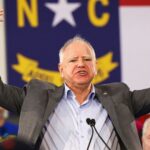This year’s Nobel Peace Prize was awarded to a group of Japanese citizens who survived the 1945 atomic bombings during World War II and have spent the decades since advocating against the use of nuclear weapons.
On Aug. 6, 1945, the United States dropped the first atomic bomb used in wartime on the Japanese city of Hiroshima. Three days later, a second atomic bomb was dropped on Nagasaki. Japan surrendered days later.
Years after the war, the group Nihon Hidankyo was formed by witnesses of the bombings who have tried to publicize the threat to mankind represented by nuclear weapons.
The survivors of Hiroshima and Nagasaki are known in Japanese as “hibakusha,” or “bomb-affected people,” according to The New York Times.
“The Hibakusha help us to describe the indescribable, to think the unthinkable, and to somehow grasp the incomprehensible pain and suffering caused by nuclear weapons,” the Nobel committee said, according to CNN.
In a post on X, the committee quoted Hiroshima survivor Setsuko Thurlow, who was 13 when the atomic bomb was dropped.
“We rose up. We shared our stories of survival. We said: Humanity and nuclear weapons cannot coexist,” she is quoted as saying.
“We rose up. We shared our stories of survival. We said: humanity and nuclear weapons cannot coexist.”
Setsuko Thurlow (pictured) was just 13 years old when an atomic bomb was dropped on Hiroshima, the city she lived in. She is one of the Hibakusha – the survivors of the… pic.twitter.com/LvWM2rqki3
— The Nobel Prize (@NobelPrize) October 11, 2024
Dan Smith, director of the Stockholm International Peace Research, praised the selection.
Are you in favor of countries arming themselves with nuclear weapons?
Yes: 0% (0 Votes)
No: 100% (6 Votes)
“As the Soviet and U.S. leaders Gorbachev and Reagan said in 1985, nuclear war can never be won and must never be fought. The Hibakusha remind us of that every day,” Smith said, according to CNN.
Jørgen Watne Frydnes, chair of the Norwegian Nobel Committee, said the award was made against a backdrop of concerns that nuclear weapons could be used again, according to The Associated Press.
Russian leader Vladimir Putin recently announced that his country revised its nuclear doctrine in what appeared to be a move to deter Western governments from allowing Ukraine to use long-range weapons to hit Russia.
Putin and his aides have made multiple references to the use of nuclear weapons ever since the West responded to Russia’s invasion of Ukraine by backing Ukraine.
Watne Frydnes said the Nobel committee “wishes to honor all survivors who, despite physical suffering and painful memories, have chosen to use their costly experience to cultivate hope and engagement for peace.”
“It is very clear that threats of using nuclear weapons are putting pressure on the important international norm, the taboo of using nuclear weapons,” Watne Frydnes said when asked about Russia’s bellicose rhetoric, according to the AP.
“And therefore it is alarming to see how threats of use is also damaging this norm,” he added.
U.N. Secretary-General Antonio Guterres noted that talk of using nuclear weapons has increased.
“Nuclear weapons remain a clear and present danger to humanity, once again appearing in the daily rhetoric of international relations,” he said.
“It is time for world leaders to be as clear-eyed as the hibakusha, and see nuclear weapons for what they are: Devices of death that offer no safety, protection, or security.”
Advertise with The Western Journal and reach millions of highly engaged readers, while supporting our work. Advertise Today.







